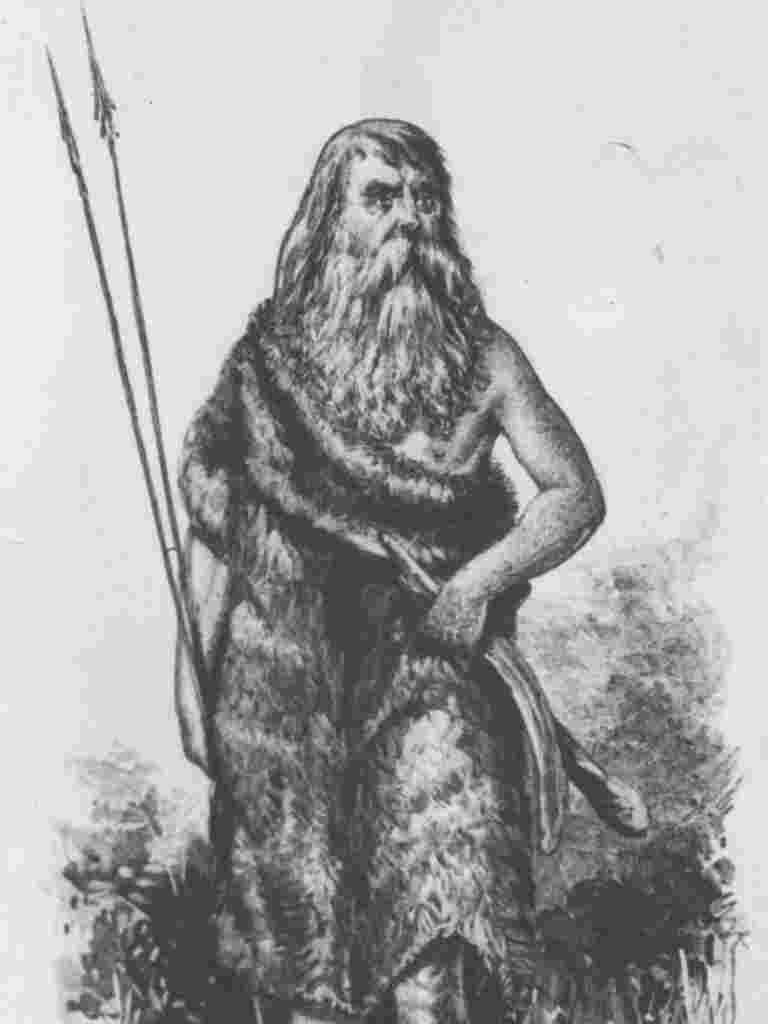

William Buckley – A unique Australian Legend
William Buckley is a unique Australian Legend. Substantial parts of his life experience included both the cultural life of the English peasantry before private land titles and the cultural life of the First Nations people of Australia before white settlement. He lived for over thirty years with First Nations people of the Bellarine Peninsula in Victoria prior to their other white contact. He discovered their lifestyle had similarities to his childhood in Cheshire, England, in terms of the freedom to roam freely to hunt and gather on common land before the Acts of Enclosure introduced in England in the 1750s.
William was born in 1780 in Marton, Cheshire County, England. As a child and in early adolescence, he would freely hunt deer and rabbits with his father on common land. In later youth, Buckley did a builder’s apprenticeship as a bricklayer and was involved in back-breaking construction work for meagre pay. He enlisted in the local militia to seek a better life, remuneration and conditions. Military service was a way out of poverty for English peasants whose way of life was increasingly undermined by restrictions on hunting and gathering on hitherto common land. Peasantry became synonymous with poverty, especially into the 1800s as industrialisation and private land title took hold of rural and regional areas near cities like Manchester, Liverpool and Lancaster.
Early in the Napoleonic Wars (1803 – 1815), the British recruited from various rural militia for service in a military campaign in Holland against the French. Buckley grasped the opportunity to enlist in the regular army to earn significantly more money. However, after returning to England, he was accused of theft. He pleaded his innocence. However, the court hearing, which probably lasted two minutes, resulted in a sentence of transportation to New South Wales for 14 years.
Buckley left England at twenty-three years of age in April 1803 aboard the HMS Calcutta, a fifty-six-gun frigate. The Calcutta carried over three hundred and fifty convicts and a regiment of marines. It was one of two ships sent to Port Phillip Bay to form a new settlement under Lieutenant-Colonel David Collins, arriving in October 1803 near modern-day Sorrento, to a place Collins named Sullivan Bay. However, it appears Collins was not that interested in developing a settlement and was keener on returning to England, especially since he was offered five hundred pounds and the option to return to England if things didn’t work out. So when the new settlement ran into problems providing food and water, Collins decided to split from Sullivan Bay after hearing the Derwent River in Van Diemen’s land was more able to support a new settlement. Hobart Town was settled thirty-three years early than the Melbourne-Port Phillip Bay region as a result of that decision by Lieutenant Collins.
On hearing Collins was going to leave Port Phillip Bay, Buckley and three other convicts escaped. The escapees hugged the beaches, rivers and bushland of Port Phillip Bay till they reached the Yarra River. Eventually, Buckley continued on his own and ventured off to the other side of the bay. Then, maybe with some trepidation about never seeing a fellow country man again, he observed the Sullivan Bay settlement leave for Van Diemen’s Land across the other side of the bay in mid-1803.
William survived for several months alone. He travelled alone as far as modern-day Aireys Inlet (Mangowak) and Mount Defiance (Noorak) in the western district of Victoria, living mainly off seafood. Then one day, Buckley found a spear intending to use as a walking stick. Unbeknownst to Buckley, he had taken the spear used to mark a grave by the local aboriginals. Shortly after finding the spear, he encountered a group of Wathaurong women, who befriended him because he had the spear. They recognised the spear as belonging to a recently deceased relative, inviting him back to their camp. The woman concluded that Buckley embodied the dead person’s spirit because the spear was in his possession. A lucky break for a lonely, desperate, isolated man. Triggered by the spiritual association between the spear and the spirit of the deceased, they recognised his gentle soul and openly welcomed Buckley into the tribe attributing to him spiritual prowess and respect
He continued to live among the Wathaurong people for the next thirty-two years. Buckley became a Ngurungaeta, a respected member of the tribal group. Viewed as a spiritual man, they consulted him about disputes in the tribe and between the tribes of the Wathaurong people. Buckley participated fully in hunter-gathering Aboriginal life, including having at least two wives and a daughter.
Buckley’s ability to blend into their ways of being together was probably due to his familiarity with aspects of nomadic life from his childhood and early adolescence. The lifestyles and customs of English Peasantry and that of First Nations people of Australia, before white settlement, were similar. Both were based on shared access to land to hunt and collect without fences restricting movement. In rural England, private land title was underpinned by Acts of Enclosure laws introduced in the 1750s, which allowed individuals to fence off what was hitherto common land making it private. Common land means land for common use. So before the Acts of Enclosure, peasants in rural English would graze stock and hunt and collect freely in the surrounds of their township or village in their respective counties. One would assume they did this according to oral agreements and understandings between the county and village residents going back hundreds of years. As a child or adolescent, William Buckley would hunt rabbits, deer and pheasant freely in his surroundings as his father did before that. Post the introduction of the Acts of Enclosure in 1750 if William crossed a fence to hunt wild game, he could be deemed to be trespassing if he did so without the express permission of the private land owner and jailed.
Similarly, the first Nations people worldwide hunted and collected freely in their particular national and tribal areas. There were no physical fences in Australia before white settlement separating the interests of one individual from or over another. A vital benefit of this free access to the land was it fostered a strong sense of community and commonality. Prior to private ownership laws in England, one would assume villagers and town’s folk hunted and collected by centuries-old agreements and understandings between each other. Once the Acts of Enclosure were introduced, arrangements between residents that underpinned solidarity and commonality, going back centuries, counted for less in a court of law if there was a dispute between residents. In this sense, individuality took precedence over the common good.
In conclusion, William Buckley was a unique Australian Legend for three main reasons. Firstly, he experienced First Nations people’s way of being utterly free of external influence and contamination for over three decades. Secondly, he experienced the types of freedom of movement and cultural cohesion common to English Peasantry and First Nations people of Australia before the fencing of private property in England and Australia. Finally, he integrated with the First Nations people without harming them. In fact, he was respected, and they sought his advice. Buckley’s life is an exemplar par excellence which gives weight to the view that the violence rained down of First Nations people since the white settlement was utterly unnecessary for co-habitation.

